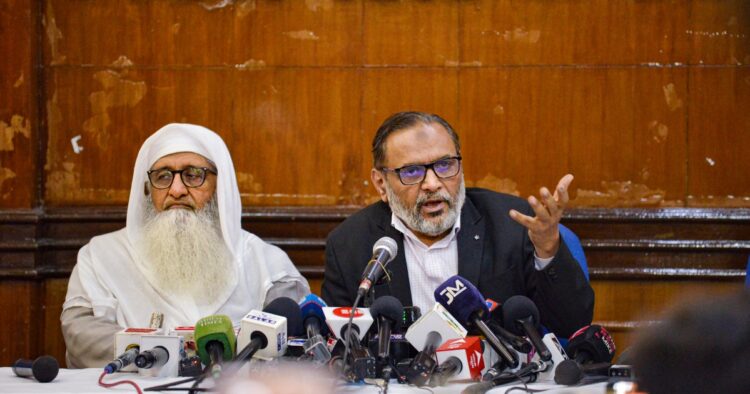The Waqf Amendment Bill 2025 has created a storm in the country. And this article will tell you everything about the protests, threats, and what’s really going on- so stay with it till the end.
Who is opposing the Waqf Amendment Bill?
As the Waqf Amendment Bill was tabled in Parliament on April 2, voices of opposition began rising sharply, particularly from Muslim leaders and organizations. Delhi AIMIM President Dr. Shoaib Jamai threatened a nationwide movement if the bill is passed, warning that the protest will start from Delhi. He said, “We will not tolerate any attack on minority rights guaranteed by the Constitution.”
Similarly, Jamiat Ulema-e-Hind President Maulana Arshad Madani threatened to fight from the streets to the Supreme Court, claiming the bill is a “direct attack” on the religious rights of Muslims. He appealed to secular political parties to prove their loyalty to the Constitution by voting against the bill.
But this raises a serious question: Is threatening the government over a constitutional amendment the right way to protect democracy, or a way to hold it hostage?
What does the Waqf Amendment Bill really say?
The Waqf Amendment Bill 2025 proposes certain changes to the Waqf Act of 1995, which manages the administration of Muslim religious endowments. According to the government, the amendments aim to bring transparency, accountability, and uniformity in the management of waqf properties.
Many opposition parties, however, are calling it “unconstitutional” and say it discriminates against Muslims. But the fact is, similar legal protections and management rules exist for temples, churches, and other religious institutions in India. Then why is there a panic only from a few specific groups?
The Waqf Amendment Act 2025 officially came into effect on April 8 after receiving the President’s assent. However, the controversy is far from over, as the Supreme Court is set to hear multiple petitions challenging the constitutional validity of the Act on April 16, setting the stage for a high-stakes legal battle. In Parliament, the ruling NDA government, led by the BJP, got support from key allies like the TDP, JD(U), Shiv Sena, and Lok Janshakti Party. These parties even issued a whip to ensure their MPs voted in favour.
A total of eight hours were allotted for discussions in each house, and the debate went on till midnight, after which the bill was passed. So it is wrong to say that the bill was forced or rushed through. The process was democratic, and all sides got a chance to speak.
Despite being passed through democratic means, several Muslim organizations, including AIMIM, Jamiat Ulema-e-Hind, Jamaat-e-Islami Hind, and the All India Muslim Personal Law Board (AIMPLB) have issued threats of mass protests. The AIMPLB even called the passage of the bill a “dark chapter” and accused the government of ignoring Muslim voices.
Mufti Mohammad Akbar Qasmi from Aligarh said, “Muslims will come out on the streets like they did in 1947.” Isn’t it alarming that someone is comparing a constitutional amendment in 2025 with the partition-era unrest of 1947?
Are these protests democratic, or pressure tactics?
Let’s be clear, everyone has the right to protest peacefully in a democracy. But giving statements like “we will not sit quietly”, “we will fight till the last breath”, or “there will be a nationwide movement” are not just protests, they sound like pressure tactics to influence elected representatives and threaten democratic institutions.
If the bill was unconstitutional, why not challenge it in the Supreme Court? Why threaten street protests before even trying the legal path?
The truth is that the Waqf Amendment Bill applies only to the administration of religious endowment properties, and similar rules are already applied to Hindu temples and Sikh gurdwaras. But the protest leaders are trying to paint it as an attack on Islam, when it’s actually an attempt to prevent misuse and corruption in the management of waqf land.
Shouldn’t every Indian support more transparency in how religious properties are managed, regardless of religion? A closer look shows that most of the opposition to this bill is not coming from the general public, but from specific political and religious organizations. Their statements are full of emotional language, threats, and historical references meant to create fear.
The Waqf Amendment Bill has been passed lawfully, with debate, discussion, and majority support in both houses of Parliament. Any genuine concern should now be raised through the courts, not through threats or fear-mongering.
India is a democracy, not a hostage to religious vote banks. The time has come to stand by the rule of law and constitutional values, not be scared by those who believe in creating unrest when democracy doesn’t go their way.

















Comments